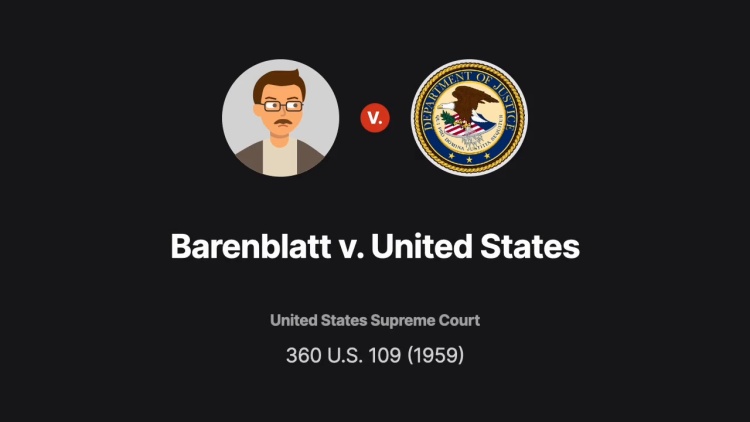Barenblatt v. United States
United States Supreme Court
360 U.S. 109 (1959)
- Written by David Schleider, JD
Facts
In June of 1954, Lloyd Barenblatt, a former psychology professor at Vassar College, appeared before a subcommittee of the U.S. House Committee on Un-American Activities. Prior to Barenblatt's appearance, an ex-communist named Francis Crowley had testified before the subcommittee that Barenblatt had been a communist from 1947-1950, while he was a graduate student and teaching fellow at the University of Michigan. During Barenblatt's appearance, Barenblatt testified that he had been a graduate student and teaching fellow at the University of Michigan from 1947-1950 and that he knew Crowley. However, he objected generally to the subcommittee's right to question him about his political and religious beliefs and any of his other personal or private affairs. He also objected specifically to five questions and refused to answer them: (1) whether he was currently a member of the Communist Party, (2) whether he had ever been a member of the Communist Party, (3) whether he knew Francis Crowley as a member of the Communist Party, (4) whether he was ever a member of a Communist Party-affiliated club at the University of Michigan, and (5) whether he was a member of the University of Michigan Council of Arts, Sciences, and Professions. Barenblatt was indicted on five counts of contempt of Congress, one count for each question he refused to answer. After a bench trial in federal district court, Barenblatt was convicted and sentenced to six months in prison and a $250 fine. The appellate court affirmed Barenblatt's conviction, and the United States Supreme Court granted certiorari. One of Barenblatt's arguments to the Court was that the questions he refused to answer violated his First Amendment rights.
Rule of Law
Issue
Holding and Reasoning (Harlan, J.)
Dissent (Black, J.)
What to do next…
Here's why 907,000 law students have relied on our case briefs:
- Written by law professors and practitioners, not other law students. 47,100 briefs, keyed to 996 casebooks. Top-notch customer support.
- The right amount of information, includes the facts, issues, rule of law, holding and reasoning, and any concurrences and dissents.
- Access in your classes, works on your mobile and tablet. Massive library of related video lessons and high quality multiple-choice questions.
- Easy to use, uniform format for every case brief. Written in plain English, not in legalese. Our briefs summarize and simplify; they don’t just repeat the court’s language.





